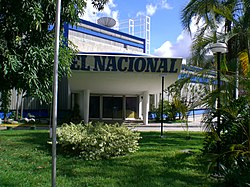El Nacional (Venezuela)
 El Nacional building | |
| Type | Daily newspaper |
|---|---|
| Format | Broadsheet |
| Owner(s) | Miguel Henrique Otero |
| Publisher | C.A. Editorial El Nacional |
| Founded | 3 August 1943 |
| Ceased publication | 14 December 2018 (print edition) |
| Headquarters | Caracas |
| Circulation | 20,000 (daily) |
| Website | www |
El Nacional is a Venezuelan publishing company under the name C.A. Editorial El Nacional, most widely known for its El Nacional newspaper and website. It is one of the most widely read and circulated daily national newspapers in the country. In 2010, it had an average of 83,000 papers distributed daily and 174,000 copies on Sundays.[1]
It has traditionally had a center-left ideology, but has recently[when?] moved to the center.[citation needed] The paper supported the candidacy of Hugo Chavez in 1998.[citation needed] Current editor and proprietor Miguel Henrique Otero founded the Movimiento 2D opposition movement, which supports the opposition electoral coalition Mesa de la Unidad Democrática.[citation needed]
Since the increase of censorship in Venezuela during the presidencies of Hugo Chávez and Nicolás Maduro, El Nacional was described by The Washington Post in 2018 as one of the last independent newspapers in Venezuela.[2]
El Nacional published its final print edition on 14 December 2018 (after having been cut to five print editions per week back in August), joining in the dozens of anti-government newspapers in the nation that have stopped printing due to paper and toner shortages. It became an exclusively online newspaper after the date.[3][4]
Contributors and owners[]
El Nacional was founded in August 1943 in Caracas by Miguel Otero Silva and is directed by Chief Editorial Officer Miguel Henrique Otero, grandson of the founder, and by Chief Executive Officer .[citation needed]
The newspaper's first director was poet (1903–1962).[citation needed] In the newspaper have contributed many of the most recognized Venezuelan writers.[clarification needed] Its director, Arturo Úslar Pietri, wrote an opinion column in the newspaper for more than 50 years.[citation needed] Former editors include José Ramón Medina and Miguel Otero Silva.[citation needed]
In 1961 an advertising boycott in opposition to the paper's leftist views (its then editor, Miguel Otero Silva, had been a member of the Communist Party of Venezuela) nearly forced the paper into bankruptcy.[5]
Editorial position and management[]
Historically, the newspaper received criticism by the governments under the AD and COPEI parties for it had tended to support the political beliefs of the moderate left and the middle class.[6][better source needed]
In late 2007 editor and proprietor Miguel Henrique Otero founded the Movimiento 2D opposition movement, which supported the opposition electoral coalition Mesa de la Unidad Democrática in the September 2010 parliamentary election.[7]
Reception[]
On 14 April 2018, colectivos attacked the headquarters of El Nacional, kidnapping security workers and a janitor.[8]
Weeks after the Venezuelan presidential election in 2018, the newspaper had their Hypertext Transfer Protocol momentarily censored by the state-run CANTV from 7 June to 11 June 2018.[9]
He was not surprised. In May, CONATEL had opened a case against El Nacional’s website for allegedly violating media laws by spreading messages that “disregard authorities” and “incite hate.” The government insisted the website abstain from publishing information that could “alter public order.”
The newspaper has had its website censored in Venezuela. In 2018, it was described by The Washington Post as one of the last independent newspapers in Venezuela.[2]
In May 2018, the Venezuelan telecommunications watchdog CONATEL charged the newspaper with allegedly violating media laws by spreading messages on its website that "disregard authorities" and "incite hate". The government asked the newspaper to stop publishing information that could "alter public order".[2] After the government pressed charges against El Nacional, imposing a fine of 1 billion bolívares, Bolivarian government official Diosdado Cabello replied to the newspaper's publishing of Venezuela's hyperinflation figures stating "if it was a billion bolívares, let's ... put five zeros next to it".[10] Cabello targeted the newspaper even further, stating in late-September 2018 that he sought to acquire the newspaper's headquarters and convert it into a university.[11]
References[]
- ^ (in Spanish) , De Caracas para Venezuela Archived 2012-04-25 at the Wayback Machine
- ^ Jump up to: a b c "As it slides toward authoritarianism, Venezuela targets one of its last independent newspapers". The Washington Post. 5 July 2018. Retrieved 2018-07-06.
- ^ "Venezuela's El Nacional newspaper to cease print edition". AP NEWS. 2018-12-13. Retrieved 2018-12-14.
- ^ "Venezuela's biggest daily, El Nacional, latest casualty of newsprint restrictions". Committee to Protect Journalists. 2018-12-17. Retrieved 2018-12-20.
- ^ Virtue, John et al (1994), Journalists in the Andes, Florida International University, p119
- ^ EL PERIÓDICO EL NACIONAL DE VENEZUELA Y LAS ELECCIONES EN ESTADOS UNIDOS (in Spanish)
- ^ (in Spanish) El Nacional, 26 February 2010, Movimiento 2D apoyará a Mesa de la Unidad para comicios del 26-S Archived 2011-07-10 at archive.today. Movimiento 2D apoyará a Mesa de la Unidad para comicios del 26-S, archived from the original on 2010-03-05, retrieved 2014-09-27
- ^ "Colectivos asaltan sede de El Nacional en El Silencio". La Patilla (in Spanish). 14 April 2018. Retrieved 16 April 2018.
- ^ "Los bloqueos de La Patilla y El Nacional revelaron una nueva forma de censura en internet". La Patilla (in Spanish). Retrieved 2018-06-12.
- ^ "Diosdado dice que procesos contra El Nacional, La Patilla y Tal Cual siguen en curso (Video)". La Patilla (in Spanish). 2018-07-16. Retrieved 2018-07-17.
- ^ "Diosdado quiere convertir sede de El Nacional en una universidad". La Patilla (in Spanish). 2018-09-27. Retrieved 2018-09-28.
External links[]
- Official website (in Spanish)
- Today's El Nacional front page at the Newseum website
- Spanish-language newspapers
- Venezuelan news websites
- Newspapers published in Venezuela
- Publications established in 1943
- Book publishing companies of Venezuela
- Spanish-language websites
- Media of the Crisis in Venezuela